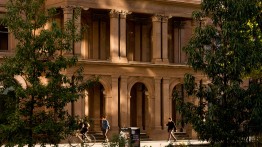Cooper Awarded Two Major New York State Grants
POSTED ON: January 10, 2022

The Cooper Union's landmark Foundation Building opened its doors in 1859. Photo: Mario Morgado
The Cooper Union is the recipient of two major New York State grants announced in December, together totaling nearly $850,000. One of the grants, provided by the New York State Council on the Arts (NYSCA), significantly increases funding for the college’s long-running Saturday Program. Another grant, funded by the Regional Economic Development Council (REDC) and awarded through New York State’s Environmental Protection Fund (EPF) Program for Parks, Preservation, and Heritage, matches funds up to $750,000 toward the historic preservation and restoration of the façade of Cooper Union’s landmark Foundation Building.
The Saturday Program was founded by undergraduate students at The Cooper Union in the late 1960s and provides free education in the arts to underserved New York City high school students. The program is one of more than 1,000 organizations across the state that have benefited from a recent vote by state legislators to increase aid for the arts by $45 million via NYSCA grants. These grants are aimed at boosting nonprofit cultural organizations and artists who have been impacted by the ongoing challenges of COVID-19, including art programs like Cooper’s that were temporarily forced to suspend in-person learning.
“The arts have long been a critical sector in our economy, and as we continue to rebuild a stronger New York, it's essential we do all we can help this industry thrive once again,” said New York State Governor Kathy Hochul in a press statement. “These awardees represent the best of what New York's vibrant communities have to offer and with this funding in hand, they will be able to not only continue their creative and inspiring work, but help spur revitalization in their own backyard as well.”
NYSCA has funded the Saturday Program’s Senior Studios (formerly known as Portfolio Prep) since 1989, typically providing about $15,000 annually for a year-long course designed to help high school seniors develop portfolios for admissions to art and architecture colleges. This year, with the increase in NYSCA funding, the Saturday Program received multi-year awards, including $49,500 a year for two years, representing a significant state investment in providing free and equal access to hands-on arts education to diverse cohorts of New York City students.
“The Saturday Program is a direct link to our institution’s founder, Peter Cooper, and his vision of making education tuition-free,” says Jamerry Kim, director of the Saturday Program. “Throughout the program’s 53-year history, we’ve been very singular in sustaining that vision. We’ve served over 10,000 high school students so far, and this generous funding from NYSCA ensures we can continue to serve and to enrich creative, meaningful opportunities for NYC public high school students who are at a critical juncture in their lives.”
The restoration of Cooper’s historic Foundation Building façade has similarly benefited from the state’s investment in pandemic recovery efforts. The project is one of 488 that were allocated a combined $196 million thanks to REDC’s initiative to stimulate community revitalization. The REDC funding will help preserve the Foundation Building’s unique architectural characteristics, which are protected as both a New York City Landmark and a National Historic Landmark.
Since its opening by Peter Cooper in 1859, the building has played an integral role not only in the education of Cooper Union students but in the civic life of New York City and the nation. As a free center of public learning, the Foundation Building houses the Cooper Union Library, public galleries, and the legendary Great Hall, which has been a forum hosting countless influential voices throughout American history, from Abraham Lincoln, Frederick Douglass, Susan B. Anthony, Elizabeth Cady Stanton, and Sioux Chief Red Cloud to more recent figures like Gloria Steinem, Barack Obama, and John Lewis.
Instrumental in helping The Cooper Union secure the EPF grant were its state representatives, Deborah J. Glick, member of the New York State Assembly representing the 66th District, and Brad Hoylman, New York State Senator representing the 27th District. Both Assemblymember Glick and Senator Hoylman—who were also responsible for approving the major increase in state funding for the arts through NYSCA—wrote letters in support of the restoration project, highlighting the building’s historical significance and the Great Hall’s contributions to the cultural life of the local community and the city. A letter of support for the grant also came from the local business improvement district, the Village Alliance.
Restoration work on the building is now underway, with the grant supporting the replacement and refurbishment of various façade elements in accordance with its original architectural design and construction. The aim is to preserve the beauty of the Foundation Building as an important hub of educational and civic life for many future generations of New Yorkers.
The Cooper Union Saturday Program is made possible by the New York State Council on the Arts with the support of the Office of the Governor and the New York State Legislature.




